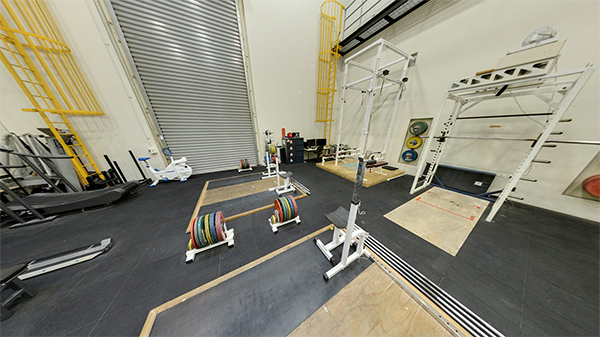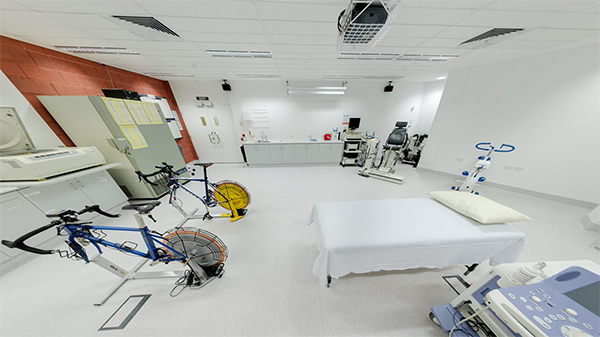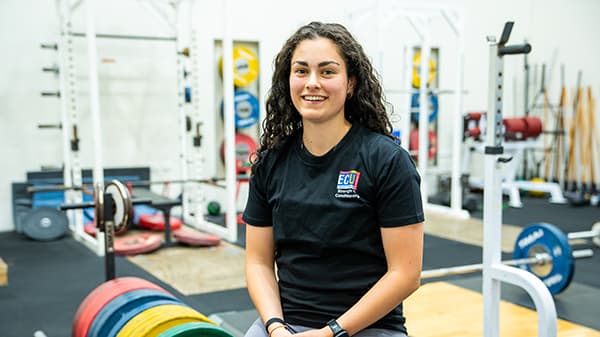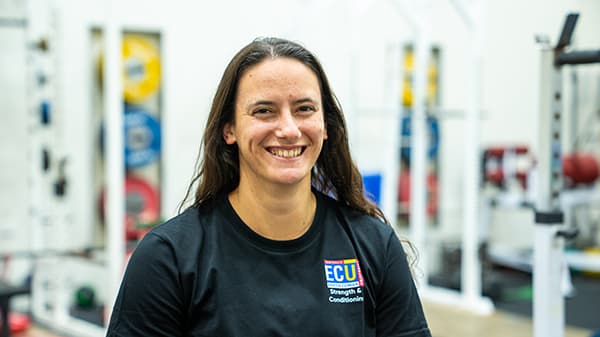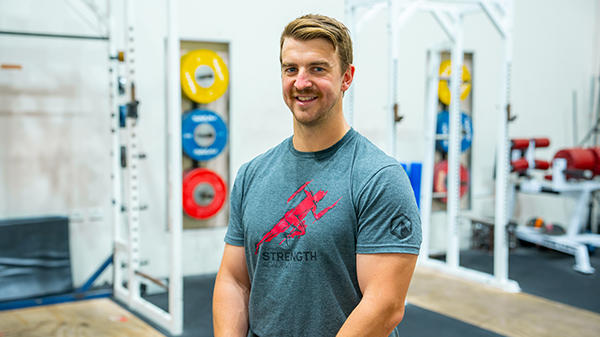Master of Exercise Science (Strength and Conditioning)
Course code U94
Why study at ECU?
Toggle between study options for Domestic or International students
About this Course
This coursework degree provides sports science or related graduates an opportunity for advanced study and to enhance their training in the field of strength and conditioning.
Australian Qualifications Framework (AQF) level
This course has been accredited by ECU as an AQF Level 9 Masters Degree (Coursework) Award.
Course code
U94Entry requirements
ECU admission and English language requirements apply.
See Course Entry for further information.
Admissions
Fees
Domestic fee paying - estimated 1st year indicative fee AUD $25,750
See Fees and Scholarships for further information.
Availability & Campus
| Location | Semester 1 | Semester 2 |
|---|---|---|
| Joondalup | ||
| Mount Lawley | ||
| South West | ||
| Online | FT PT | FT PT |
Timetable
This course has a modified timetable. See Course Notes.
About this Course
This coursework degree provides sports science or related graduates an opportunity for advanced study and to enhance their training in the field of strength and conditioning.
Australian Qualifications Framework (AQF) level
This course has been accredited by ECU as an AQF Level 9 Masters Degree (Coursework) Award.
Course code
U94Entry requirements
ECU admission and English language requirements apply.
See Course Entry for further information.
Fees
International students - estimated 1st year indicative fee AUD $38,600
See Fees and Scholarships for further information.
Availability & Campus
| Location | Semester 1 | Semester 2 |
|---|---|---|
| Joondalup | ||
| Mount Lawley | ||
| South West | ||
| Online | FT PT | FT PT |
Timetable
This course has a modified timetable. See Course Notes.
Course Entry
Admission requirements you'll need to meet for this course.
-
The following course-specific admission requirements are mandatory and must be satisfied by all applicants. These requirements are in addition to or supersede the minimum requirements outlined within the Academic admission requirements band section below.
All applicants are required to have successfully completed a Bachelor degree in Sports Science, Human Movement, Physical Education, Exercise Physiology, Kinesiology or a similar program of study. In particular, an undergraduate background in human anatomy and physiology is required. Alternatively applicants can apply if they possess a Bachelor degree in another area and have demonstrated strength and conditioning experience, at the discretion of the Course Coordinator.
Academic admission requirements (Band 8) may be satisfied through completion of one of the following:
- Bachelor degree in a cognate discipline; or
- Where accepted, equivalent prior learning, including at least five years relevant professional experience.
-
English competency requirements may be satisfied through completion of one of the following:
- IELTS Academic Overall band minimum score of 6.5 (no individual band less than 6.0);
- Bachelor degree from a country specified on the English Proficiency Bands page;
- Successfully completed 0.375 EFTSL of study at postgraduate level or higher at an Australian higher education provider (or equivalent);
- Where accepted, equivalent prior learning, including at least five years relevant professional experience; or
- Other tests, courses or programs defined on the English Proficiency Bands page.
Course Entry
Admission requirements you'll need to meet for this course.
-
The following course-specific admission requirements are mandatory and must be satisfied by all applicants. These requirements are in addition to or supersede the minimum requirements outlined within the Academic admission requirements band section below.
All applicants are required to have successfully completed a Bachelor degree in Sports Science, Human Movement, Physical Education, Exercise Physiology, Kinesiology or a similar program of study. In particular, an undergraduate background in human anatomy and physiology is required. Alternatively applicants can apply if they possess a Bachelor degree in another area and have demonstrated strength and conditioning experience, at the discretion of the Course Coordinator.
Academic admission requirements (Band 8) may be satisfied through completion of one of the following:
- Bachelor degree in a cognate discipline; or
- Where accepted, equivalent prior learning, including at least five years relevant professional experience.
-
English competency requirements may be satisfied through completion of one of the following:
- IELTS Academic Overall band minimum score of 6.5 (no individual band less than 6.0);
- Bachelor degree from a country specified on the English Proficiency Bands page;
- Successfully completed 0.375 EFTSL of study at postgraduate level or higher at an Australian higher education provider (or equivalent);
- Where accepted, equivalent prior learning, including at least five years relevant professional experience; or
- Other tests, courses or programs defined on the English Proficiency Bands page.
Course Details
Semester availability
Semester 1: Study full-time Online
Semester 1: Study part-time Online
Semester 2: Study full-time Online
Semester 2: Study part-time Online
Course Structure
| Unit Code | Unit Title | Credit Points |
|---|---|---|
| SPS5113 | Research and Computer Methods in Strength and Conditioning | 20 |
| SPS5133 | Strength and Conditioning 1 - Physiology | 20 |
| SPS6104 | Applied Biomechanics in Strength and Conditioning | 20 |
U94|4
For more detailed unit information for this course take a look at our Handbook. To organise your life for next semester visit the Teaching timetable.
Student handbookCourse notes
Important course notes
-
SPSS6105: Students are required to attend an intensive two-week workshop held at the Joondalup campus.
-
Online students of this course will be required to attend on-campus activities for SPS6105 which is delivered as a two-week intensive workshop on our Joondalup Campus.
Attendance requirements
Eight of the nine units are completed online. SPS6105 is a two-week intensive workshop completed at ECU's Joondalup campus. This unit is completed toward the end of Semester 2 as part of the Strength and Conditioning Practicum.
Course learning outcomes
- Critically appraise a complex body of scientific knowledge, research principles and methods to demonstrate mastery of exercise science strength and conditioning.
- Apply cognitive, technical and creative skills to evaluate athlete performance and apply knowledge in complex physical training situations.
- Use high level self-management skills to initiate, plan and execute an industry-specific journal article.
- Apply communication and collaboration skills to complex physiological concepts and implement in applied sport science settings.
Professional Recognition
CourseRecognised by: Australian Strength and Conditioning Association (ASCA)
Graduates of this course may apply to ASCA for Level 2 Accreditation by submitting the Student Application Form and supporting documentation.
Recognised by: National Strength and Conditioning Association (NSCA)
Course Details
Semester availability
Semester 1: Study full-time Online
Semester 1: Study part-time Online
Semester 2: Study full-time Online
Semester 2: Study part-time Online
This course is not offered for study on-campus to international students with a student visa.
Course Structure
| Unit Code | Unit Title | Credit Points |
|---|---|---|
| SPS5113 | Research and Computer Methods in Strength and Conditioning | 20 |
| SPS5133 | Strength and Conditioning 1 - Physiology | 20 |
| SPS6104 | Applied Biomechanics in Strength and Conditioning | 20 |
U94|4
For more detailed unit information for this course take a look at our Handbook. To organise your life for next semester visit the Teaching timetable.
Student handbookCourse notes
Important course notes
-
SPSS6105: Students are required to attend an intensive two-week workshop held at the Joondalup campus.
-
Online students of this course will be required to attend on-campus activities for SPS6105 which is delivered as a two-week intensive workshop on our Joondalup Campus.
Attendance requirements
Eight of the nine units are completed online. SPS6105 is a two-week intensive workshop completed at ECU's Joondalup campus. This unit is completed toward the end of Semester 2 as part of the Strength and Conditioning Practicum.
Course learning outcomes
- Critically appraise a complex body of scientific knowledge, research principles and methods to demonstrate mastery of exercise science strength and conditioning.
- Apply cognitive, technical and creative skills to evaluate athlete performance and apply knowledge in complex physical training situations.
- Use high level self-management skills to initiate, plan and execute an industry-specific journal article.
- Apply communication and collaboration skills to complex physiological concepts and implement in applied sport science settings.
Professional Recognition
CourseRecognised by: Australian Strength and Conditioning Association (ASCA)
Graduates of this course may apply to ASCA for Level 2 Accreditation by submitting the Student Application Form and supporting documentation.
Recognised by: National Strength and Conditioning Association (NSCA)
Fees and Scholarships
Fees
- AUD $25,750 - Domestic fee paying estimated 1st year indicative fee 1
Note
1 The 'estimated 1st year indicative fee' is provided as a guide only, based on a typical enrolment of students undertaking the first year of this course. At ECU, you pay for the individual units you enrol in, not an overall course fee, so the total cost of your course will vary, depending on what units you choose. An indicative fee will be provided with your course offer, however you can use our Course Fee Calculator to estimate the actual amount you'll need to pay. ECU fees are adjusted annually.
Some units require the payment of a fee for incidental goods or services required to complete those units. For more information and the full list of incidental fees for courses and units, visit What are Incidental Fees.
Scholarships
ECU has a scholarship program that provides many opportunities each year to students undertaking studies here.
Find a scholarshipCareer Opportunities
Possible future job titles
Personal Trainer, Sports Coach, Strength and Conditioning Coach (at amateur and elite level)
Courses you can consider if you are interested in progressing further in this area.
- Doctor of Philosophy (Integrated)
Students interested in completing a PhD in Exercise Science should consider the Doctor of Philosophy (Integrated).
Fees and Scholarships
Fees
- AUD $38,600 - International students estimated 1st year indicative fee 1
Note
1 The 'estimated 1st year indicative fee' is provided as a guide only, and has been calculated based on a typical enrolment of students undertaking the first year of this course. At ECU, you pay for each individual unit you enrol in, not an overall course fee, so the total cost of your course will vary, depending on what units you choose. An indicative fee will be provided with your course offer, however you can use our Course Fee Calculator to estimate the actual amount you'll need to pay. ECU fees are adjusted annually.
Some units require the payment of a fee for incidental goods or services required to complete those units. For more information and the full list of incidental fees for courses and units, visit What are Incidental Fees.
Scholarships
ECU has a scholarship program that provides many opportunities each year to students undertaking studies here.
Find a scholarshipCareer Opportunities
Possible future job titles
Personal Trainer, Sports Coach, Strength and Conditioning Coach (at amateur and elite level)
Courses you can consider if you are interested in progressing further in this area.
- Doctor of Philosophy (Integrated)
Students interested in completing a PhD in Exercise Science should consider the Doctor of Philosophy (Integrated).
Need some help deciding what to study?
Our future student events include a mix of on-campus and online sessions designed to help you decide what to study at ECU.
Creative thinkers start here
Facilities
View our facilities
Explore your options
Explore your options through the following media
Creative thinkers start here
Facilities
View our facilities
Explore your options
Explore your options through the following media
Student stories
Quick guide to uni-speak
-
-
The Australian Qualifications Framework (AQF) is the national regulator of qualifications in the Australian education and training system. The AQF defines the essential characteristics, including the required learning outcomes, of the different types of qualifications issued across the higher education systems in Australia.
-
ATAR is the Australian Tertiary Admission Rank, the primary criterion for entry into most undergraduate university courses in Australia. The ATAR is a percentile score which denotes a student's ranking relative to their state-wide peers upon completion of their secondary education.
-
CRICOS is the Commonwealth Register of Institutions and Courses for Overseas Students. A CRICOS code is allocated to education institutions (like ECU) who are approved to recruit, enrol and deliver education to overseas students. Courses with a CRICOS code are available to international students who meet the entry requirements.
-
A major, or unit set, is your chosen area of in-depth study in an undergraduate course. It usually involves 8 units of study, or one-third of the units in a 3-year degree. Talk to your Student Information Office if you need help choosing a major subject.
-
Minors include between 4 and 6 study units in a specific discipline. Not all courses require you to complete a minor. Your minor subject doesn't appear on your printed degree (parchment), but is part of your academic transcript.
-
If you're enrolled in 3 or more units in a semester this is considered full-time study. To complete most 3-year degrees studying full-time you'll need to complete 4 units per semester, i.e. 24 units over 3 years.
-
-
-
If a course is available to study part-time you can generally expect it to take twice as long to complete as it would in full-time mode. Part-time students are enrolled in 1 or 2 units maximum per semester.
Note: International students who hold a student visa can only choose the full-time study option for our courses. This is to ensure the course is completed within the duration of the student visa.
-
Most courses start in Semester 1 each year, usually in the last week of February. Some courses can be started in Semester 2 (we call this mid-year). There's a week of Orientation before each semester to help you get used to uni life.
-
A lot of our courses start in Semester 2 each year, usually in the last week of July. We call this mid-year. There's a week of Orientation beforehand to help you get used to uni life.
-
We use a points system to make it easier for you to understand your study progress. Most Bachelors degree study units are allocated 15 credit points. If you're studying a 3-year full-time degree you'll need to successfully complete 360 credit points - that's 24 units x 15 points per unit.
-
These are compulsory units you have to successfully complete as part of your course.
-
An elective is a unit you choose to study that counts towards your course requirements, but isn't compulsory. For some courses we recommend elective units. In some situations, a course coordinator may approve an elective unit as a replacement for a compulsory one.
-
Quick guide to uni-speak
-
-
The Australian Qualifications Framework (AQF) is the national regulator of qualifications in the Australian education and training system. The AQF defines the essential characteristics, including the required learning outcomes, of the different types of qualifications issued across the higher education systems in Australia.
-
ATAR is the Australian Tertiary Admission Rank, the primary criterion for entry into most undergraduate university courses in Australia. The ATAR is a percentile score which denotes a student's ranking relative to their state-wide peers upon completion of their secondary education.
-
CRICOS is the Commonwealth Register of Institutions and Courses for Overseas Students. A CRICOS code is allocated to education institutions (like ECU) who are approved to recruit, enrol and deliver education to overseas students. Courses with a CRICOS code are available to international students who meet the entry requirements.
-
A major, or unit set, is your chosen area of in-depth study in an undergraduate course. It usually involves 8 units of study, or one-third of the units in a 3-year degree. Talk to your Student Information Office if you need help choosing a major subject.
-
Minors include between 4 and 6 study units in a specific discipline. Not all courses require you to complete a minor. Your minor subject doesn't appear on your printed degree (parchment), but is part of your academic transcript.
-
If you're enrolled in 3 or more units in a semester this is considered full-time study. To complete most 3-year degrees studying full-time you'll need to complete 4 units per semester, i.e. 24 units over 3 years.
-
-
-
If a course is available to study part-time you can generally expect it to take twice as long to complete as it would in full-time mode. Part-time students are enrolled in 1 or 2 units maximum per semester.
Note: International students who hold a student visa can only choose the full-time study option for our courses. This is to ensure the course is completed within the duration of the student visa.
-
Most courses start in Semester 1 each year, usually in the last week of February. Some courses can be started in Semester 2 (we call this mid-year). There's a week of Orientation before each semester to help you get used to uni life.
-
A lot of our courses start in Semester 2 each year, usually in the last week of July. We call this mid-year. There's a week of Orientation beforehand to help you get used to uni life.
-
We use a points system to make it easier for you to understand your study progress. Most Bachelors degree study units are allocated 15 credit points. If you're studying a 3-year full-time degree you'll need to successfully complete 360 credit points - that's 24 units x 15 points per unit.
-
These are compulsory units you have to successfully complete as part of your course.
-
An elective is a unit you choose to study that counts towards your course requirements, but isn't compulsory. For some courses we recommend elective units. In some situations, a course coordinator may approve an elective unit as a replacement for a compulsory one.
-
Do you have any questions about the Master of Exercise Science (Strength and Conditioning)?
The Important Things
Things you should know about if you're thinking about studying here.
Course Entry
There's more than one admission pathway into an ECU course. It depends on what you've studied already, or your work or life experience.
Fees & Scholarships
Course tuition fees can change, but we can give you an estimate of your costs. If you're eligible, a scholarship or student loan can help too.
Applying
Applying for a course is a fairly simple process, especially if you have scanned copies of qualifications, your resume or other paperwork, ready to upload.
ECU Experience
Starting a course is an exciting and sometimes daunting time, so we make a massive effort to ensure you get all the support you need to have a positive experience.




